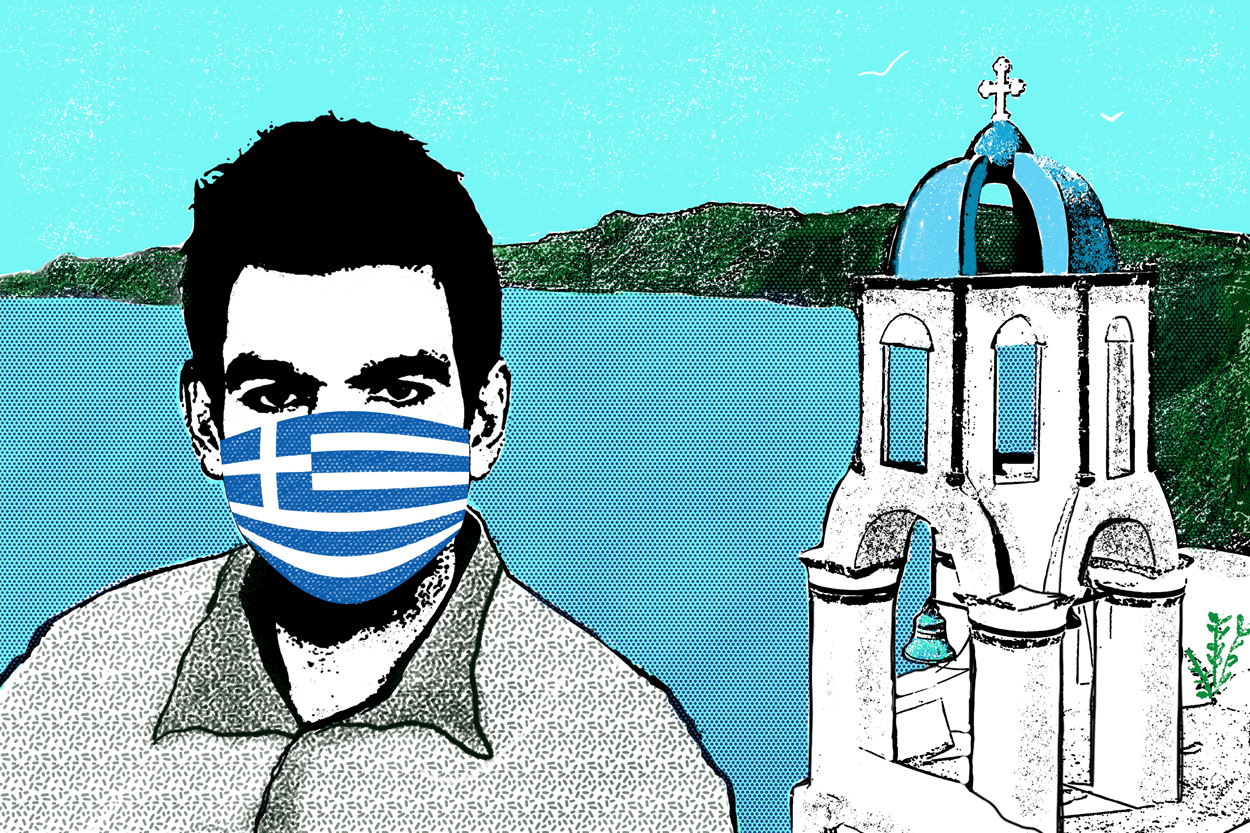How AI with MIT Roots Guided Greece’s Covid Testing at the Height of Tourist Season
-
-
Slice of MIT
- 1
Filed Under
Recommended

Kimon Drakopoulos SM ’11, PhD ’16 believes that at the start of the Covid-19 pandemic, humans were as vulnerable to the novel coronavirus as they had been to the Spanish flu that caused the pandemic a century ago.
“We had no vaccine and no cure,” he says. “Our only defense was a face mask, and they had figured that out even in 1918.” And yet, he adds, we do have a powerful tool now that they didn’t have then: the technology to collect and analyze large amounts of data.
That’s Drakopoulos’s specialty—he completed his doctoral research at MIT’s Laboratory for Information and Decision Systems (LIDS). So last April, when he read about plans to reopen the borders of Greece, his homeland, he sent an unsolicited email to the Greek prime minister saying that he’d like to help. Three hours later, he got a reply saying, “Let’s talk.”
An assistant professor of data sciences and operations at the University of Southern California’s Marshall School of Business, Drakopoulos went on to partner with the Greek government and lead the development of EVA, a tool based on machine learning that guided distribution of Greece’s limited Covid-testing resources at the country’s borders. The work of his four-member team (which also included Hamsa Bastani, Vishal Gupta PhD ’14, and Jon Vlachogiannis) served as a targeted testing, surveillance, and early-warning system that allowed Greece to more safely open its borders during the summer, boosting the country’s economy by enabling it to maximize the remainder of its tourist season.
The project worked like this: Every day, the government got a list of passengers set to enter the country: say, a 23-year-old male from Barcelona or 200 people from Brindisi in southern Italy. EVA recommended to border control agents which arrivals should be prioritized for testing based on their probability of infection and the available tests at each point of entry.
“By using this technology, we increased Greece’s testing effectiveness by a factor of two. That is, if Greece was doing random testing at the border, they would have needed double the number of tests in order to identify the same number of infected travelers as we did. By measuring actual travelers at the border, we could also observe and measure, for example, that just 1 in 1,000 Germans are sick but 100 in 1,000 Serbians are, so let’s consider closing the Serbian border,” Drakopoulos explains. “Having this actual measurement in near real-time, we could constantly update the estimates and the allocation of tests. The data shows that, without access to these measurements, looking at the number of cases, deaths, and the reported positivity rates, we wouldn’t have been able to guess the actual risk at each border.”
Drakopoulos notes that during last summer, Greece was the only European country with large-scale, near-real-time monitoring. “If you rely on publicly available data, you’re already too late,” he says.
Having this actual measurement in near real-time, we could constantly update the estimates and the allocation of tests.... If you rely on publicly available data, you’re already too late.
EVA team member Gupta, whose MIT degree is in operations research and who is also an associate professor at USC, says: “EVA goes beyond traditional predictive analytics to combine machine learning with smart operations; the key to its success was designing a system that could collect the right data in near real-time and also rapidly adapt to those data as needed.”
The EVA team spent most days last summer meeting with epidemiologists and public health officials. Amid sleepless nights of overwork, Drakopoulos participated in technical talks with the scientific team (Gupta and Bastani), and together they created contingency plans for various outcomes and ironed out technical glitches and possible failures.
Drakopoulos also managed the ground operations that involved doctors, nurses, firefighters, police, border agents, and laboratories. He met with teams of information technology developers, professors who gave advice on modeling, and three ministries managing the procurement and logistics of tests.
Drakopoulos says that not since the Athens Olympics in 2004 has he seen so many people in Greece collaborate so seamlessly on a single project. “We were given a place to stand and a lever,” he says, referencing the famous quote by Archimedes. “And at least to me, it feels like we did move the world.”
Greece paused the use of EVA on November 1 when it shut down nonessential travel, but the project will resume again soon for the country’s upcoming travel season, says Drakopoulos, who now serves as data science and operations advisor to the prime minister.
Raised in Athens by a medical doctor and a teacher of literature and ancient Greek, Drakopoulos displayed an early interest in math. Later, he was a whiz at the Ziridis High School in Sparta, and after scoring highest on the country’s standardized tests, was ranked that year’s number-one high school student in Greece. He graduated from National Technical University of Athens in 2009.
Drakopoulos started his work on analytics for epidemics at MIT, where he wrote his thesis on the control of epidemics in networks. “MIT was a life changer for me. It didn’t just have an effect, it was transforming,” he says. “It was the single most important experience of my life. When you’re surrounded by people 50 times smarter than you, you learn from them.”
A motorcycle enthusiast, Drakopoulos says southern California is a dream place to ride. He often tours the landscape with his wife, Yola Katsargyri SM ’08, PhD ’17, a fellow LIDS alum. Together the couple enjoys zooming their bike across the Mojave Desert.
Drakopoulos’s dream for the future is to wake up nontechnical people to the power of technical outcomes. “I hope for people to realize that there’s not only a lot of value in analytical-based solutions in huge, automated, very-optimized processes,” he says, “but how beneficial it can be for social good.”
Illustration by Mary Zyskowski/MIT Alumni Association.









Comments
Georgios Panayiotou
Mon, 04/26/2021 4:04am
AWESOME!
Bravo, Kimon and team!